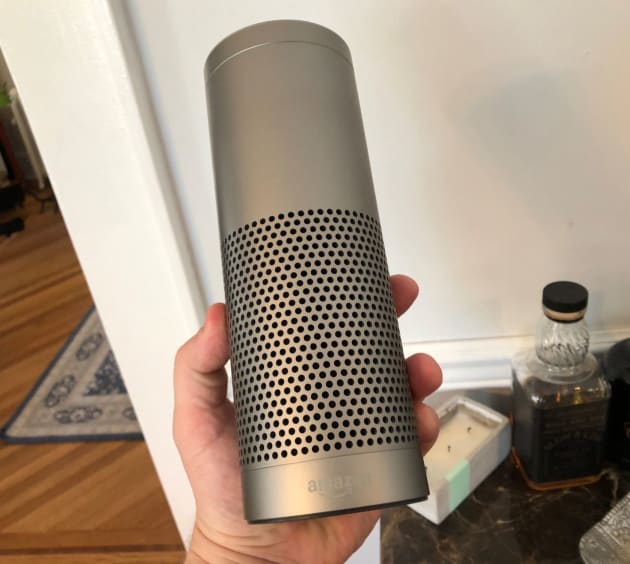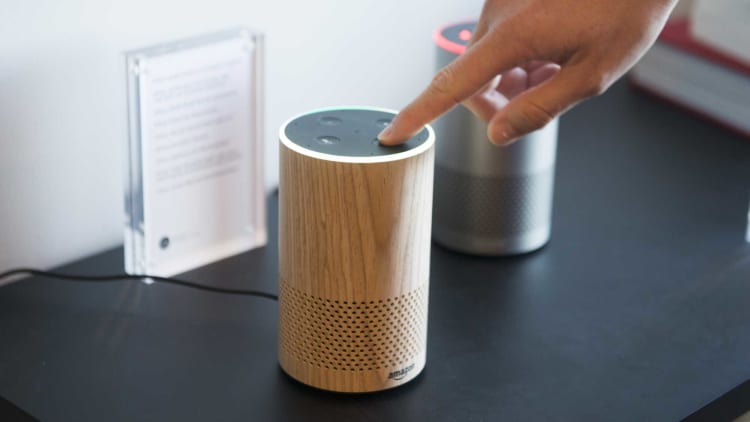‘Alexa, find me a doctor’: Amazon Alexa adds new medical skills
- Amazon Alexa is now HIPAA compliant, meaning it can work with health developers that manage protected health information.
- That’s a big step for Amazon as it moves into the health space.
- The company said it worked with partners on six new health skills, which help people make doctor’s appointments and check their health status.

Amazon’s voice assistant can now manage people’s sensitive health information, which represents an important step for the company into the $3.5 trillion health care sector.
As of Thursday, consumers will be able to use about half a dozen new Alexa health skills to ask questions such as “Alexa, pull up my blood glucose readings” or “Alexa, find me a doctor,” and receive a prompt response from the voice assistant.
Amazon is able to add these skills because Amazon can now sign business associate agreements with health providers under HIPAA, which means third-party health developers who follow certain guidelines can meet the rules and requirements that govern how sensitive health information is transmitted and received. HIPAA, or the Health Insurance Portability and Accountability Act, is designed to protect patients in cases where their personal health information is shared with a health care organization, like a hospital.
Voice technology has been heralded as a major breakthrough for the health field, particularly for seniors, kids and those with mobility problems. As a result, Amazon, and its rival Alphabet, have been increasingly focused on the needs of these populations, who view voice assistant devices as an important way to manage their medications, communicate with loved ones, and alert emergency services.
Amazon Alexa’s health and wellness team has been working for months on HIPAA compliance, and its team includes Missy Krasner, who previously ran Box’s health care efforts, and Rachel Jiang, who previously worked at Microsoft and Facebook. Jiang announced via the Alexa developer blog that six health partners have been selected for the invitation-only program, and it expects to grow that number in the coming months.
“These new skills are designed to help customers manage a variety of healthcare needs at home simply using voice – whether it’s booking a medical appointment, accessing hospital post-discharge instructions, checking on the status of a prescription delivery, and more,” Jiang wrote in the post.
Since it introduced Alexa, Amazon has seen an uptick in interest in its voice assistant technology from the health sector.
One example is Boston Children’s Hospital, which built a skill called KidsMD, that offers generalized wellness advice.
Now, Boston Children’s has a new HIPAA-compliant skill dubbed “ERAS” for kids and their families that are discharged from the hospital. Through Alexa’s voice assistant, patients and caregivers can ask specific questions about their case from the care team, and doctors can remotely check in on the child’s recovery process.
Another company selected for the program is Livongo, a digital health start-up that works with employers to help them manage workers with chronic medical conditions. The company developed a skill for people with diabetes that use connected glucometers to ask about their blood sugar levels. A user might say something like, “Alexa, ask Livongo what my my blood glucose reading was from this morning” to get a quick response.
Livongo’s president Jenny Schneider told CNBC that there are lots of reasons she expects users to embrace voice technologies, versus SMS messaging or other platforms: “Some of those people might have difficulty reading, or they just have busy lives and it’s just an easy option,” she said. The company estimates that about 20,000 of its customers already have an Alexa device in their home.
Other partners building Alexa health skills include Express Scripts, a pharmacy benefits manager, and Cigna, a health insurer that merged with Express Scripts last year. That suggests Amazon might look to work with Express Scripts as it moves more deeply into the pharmacy sector following its acquisition of Internet pharmacy company PillPack in the summer of 2018, although that remains to be seen.
Express Scripts is building a way for members to check the status of their home delivery prescription, while Cigna described their skill as helping their members “manage health improvement goals.” There’s also a skill from Providence St. Joseph Health, a Seattle health system, for people to find an urgent care center or schedule an appointment, and a similar one from Atrium Health, a health system across North Carolina, South Carolina and Georgia.
The developers behind these skills pointed to the trend of bringing health to the home, which represents both a cheaper and more convenient option for the patient. It’s also a way for providers, including doctors and nurses, to monitor patients once they leave the home, which both gives them an opportunity to prevent costly readmissions to the hospital.
“We’re in a renaissance of voice technology and voice assistants in health care,” said John Brownstein, chief innovation officer for Boston Children’s Hospital. “It’s so appealing as there’s very little training, it’s low cost and convenient.”

Discover more from ReviewFitHealth.com
Subscribe to get the latest posts sent to your email.
From Christina Farr from CNBC.Com